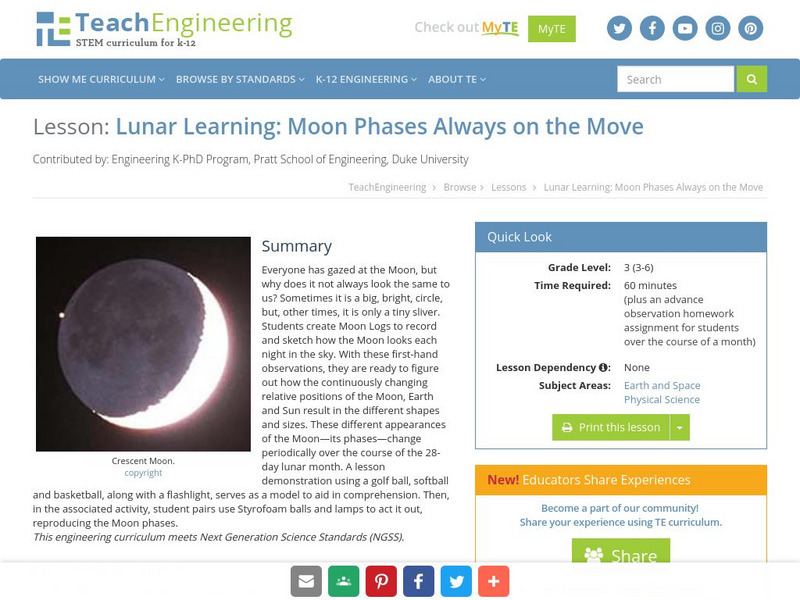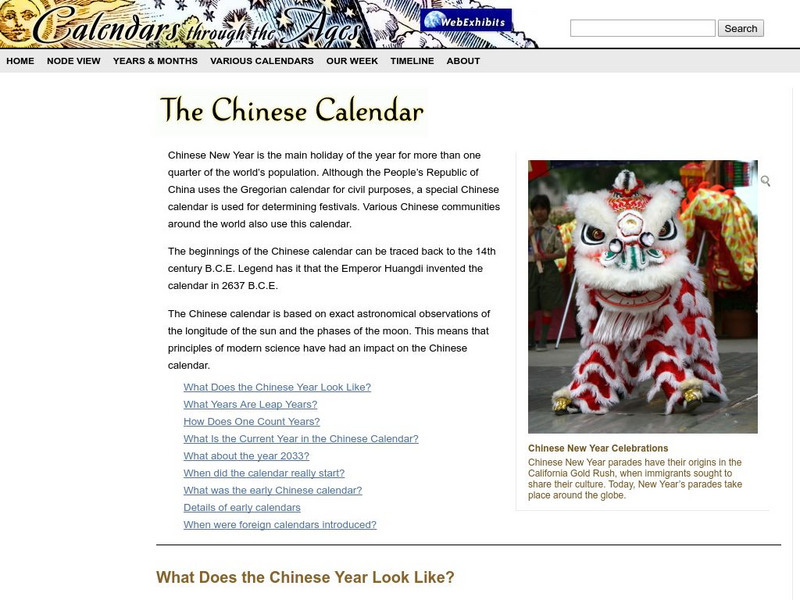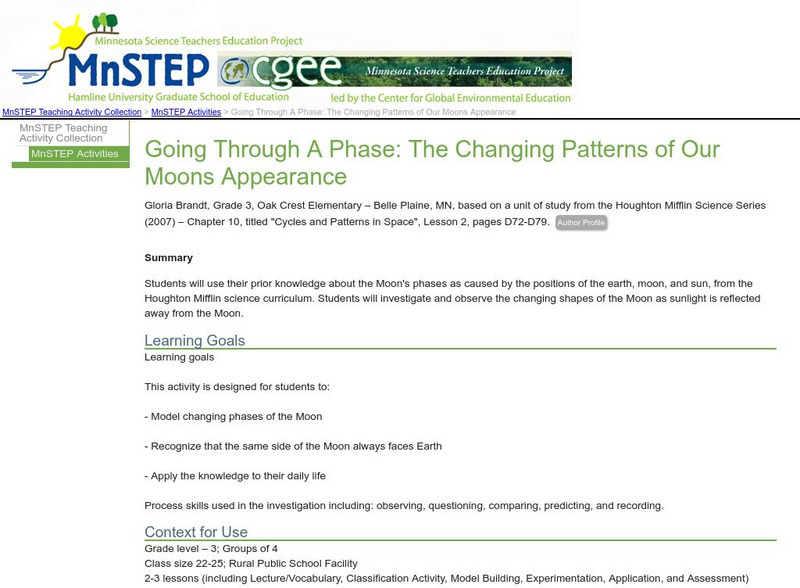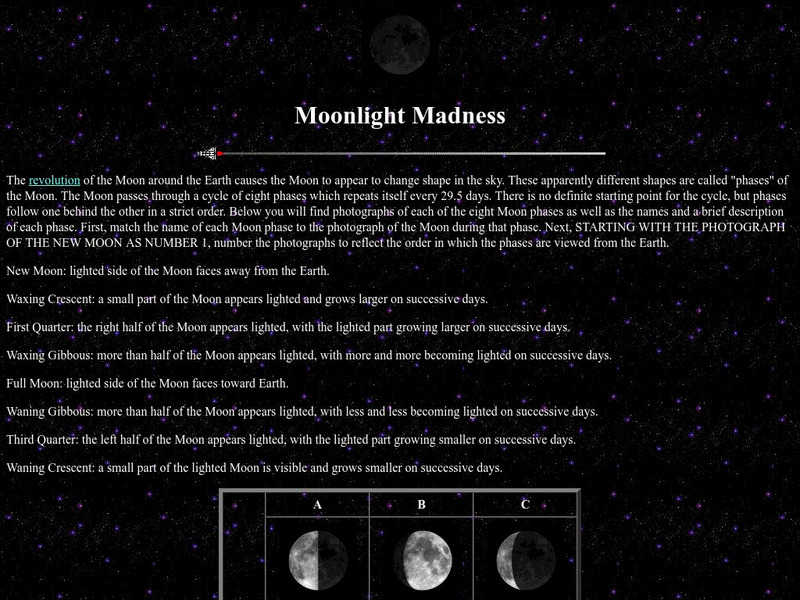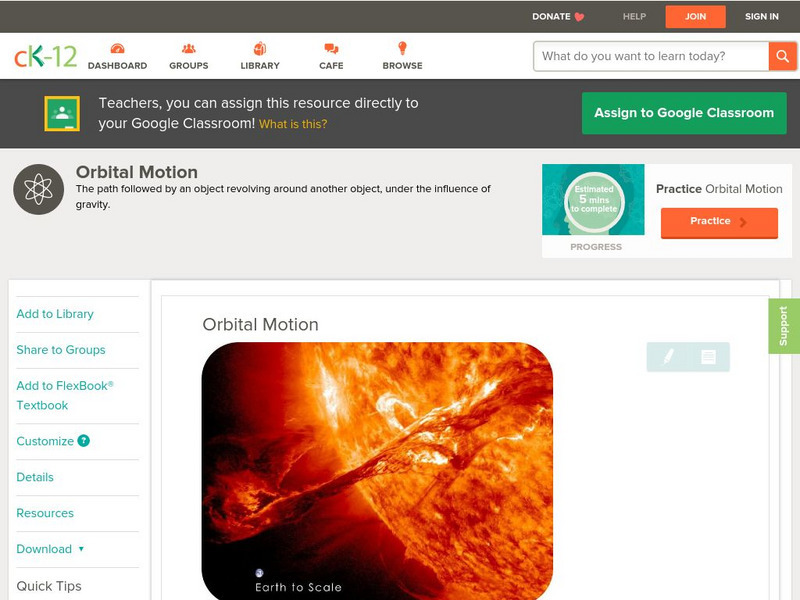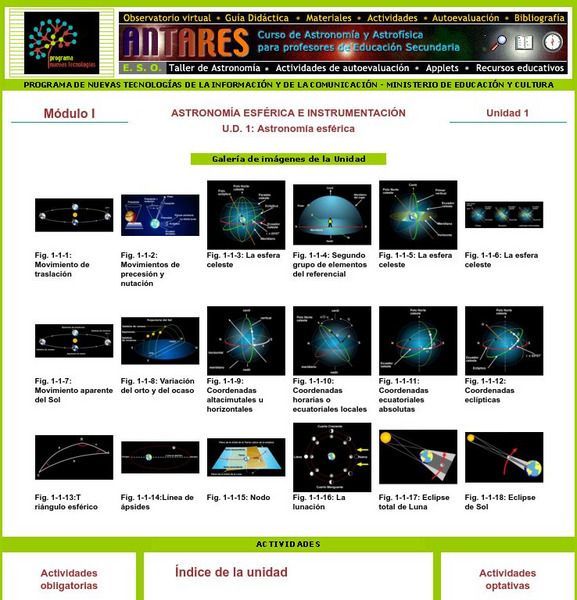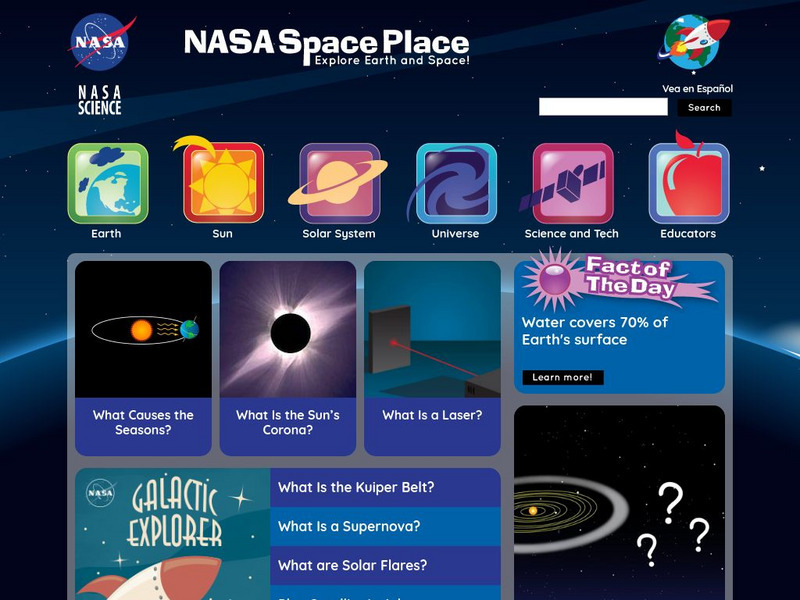Hi, what do you want to do?
Utah State Office of Education
Utah Science: What's Up There Anyway?
Far out there we observe the moon, its phases, and its constant changing position as we sit on a swing in the backyard. Investigate the science behind the moon through the activities provided.
TeachEngineering
Teach Engineering: Lunar Learning
Why does the Moon not always look the same to us? Sometimes it is a big, bright, circle, but, other times, it is only a tiny sliver, if we can see it at all. The different shapes and sizes of the slivers of the Moon are referred to as...
American Geosciences Institute
American Geosciences Institute: Astronomy
Eight hands-on lessons module in which students explore the characteristics of planet Earth, its moons, the sun, the solar system, planets, and the difference between science fact and science fiction.
Curated OER
Eyes on the Sky, Feet on the Ground: The Earth's Moon
In this online textbook produced by the Smithsonian, students explore the phases of the moon, the moon's orbit, the origin of the moon, and the tides. Includes numerous inquiry-based activities.
Other
Birthday Moons: It's Just a Phase You're Going Through
Ever notice that the moon appears to change shape? Does this occur randomly or is there a pattern? Discover the answer by taking a virtual trip to the moon for your birthday.
Institute for Dynamic Educational Advancement
Web Exhibit: The Chinese Calendar
This website gives very detailed information about all aspects of the Chinese calendar.
Institute for Dynamic Educational Advancement
Web Exhibit: The Jewish Calendar
This website gives very detailed information about all aspects of the Jewish calendar.
ArtsNow
Arts Now Learning: Moon Phaser [Pdf]
In this activity, 4th graders will study the moon for a period of one month and learn to identify each major moon phase. They will then describe the moon through poems, haikus, and similes.
Science Education Resource Center at Carleton College
Serc: Going Through a Phase: The Changing Patterns of Our Moons Appearance
Students learn about lunar phases by investigating and observing the changing shapes of the moon as sunlight is reflected away from the moon.
Alabama Learning Exchange
Alex: Sun, Earth, and Moon: Calendar of Events
During this lesson students are going to take a look at moon phases and sunrise-sunset times in order to learn about daylight hours. Students discover that we do not always have the same amount of daylight each day. This lesson is best...
Curated OER
Science Kids: Science Images: Moon Phases Diagram
Learn more about the phases of the Moon with this useful moon phases diagram. The phases include new moon, waning crescent, last quarter, waning gibbous, full moon, waxing gibbous, first quarter and waxing crescent. For more information...
Curated OER
Phases of the Moon
What is a lunar eclipse? What causes eclipses? How often do eclipses happen and when is the next lunar eclipse? You'll find the answers to these questions and more on this site on lunar eclipses.
NASA
Nasa Star Child: Moonlight Madness
The revolution of the Moon around the Earth causes the Moon to appear to change shape in the sky. These apparently different shapes are called "phases" of the Moon. The Moon passes through a cycle of eight phases which repeats itself...
Utah Education Network
Uen: Patterned Paragraphs
Students will learn about the importance of including specific details when writing. Students will watch the teacher model "How to Make a Peanut Butter Sandwich." Then student will replicate the process for writing with specificity as...
CK-12 Foundation
Ck 12: Physical Science: Orbital Motion
[Free Registration/Login may be required to access all resource tools.] Orbital motion and why it occurs, and the orbits of the Earth around the sun and the moon around the Earth.
NASA
Nasa: Eye Safety During Solar Eclipses
This resource, which is provided for by NASA, gives great information on protecting your eyes during solar eclipses. Your eyes are very difficult to replace. Even when 99% of the Sun's surface is obscured during the partial phases of a...
Ministerio de Educación (Spain)
Ministerio De Educacion: Atronomia Esferica Modulo I Unidad 1
Recognize the major constellations and learn about the sky during the different seasons of the year. You will also be able to measure the height of the mountains of the moon.
Other
Astromador: Astronomia Para Amadores
This resources focuses exclusively on astronomy. It's packed with historical facts about space exploration, famous people who pioneered the study of stars and planets. It features chronological list of space exploration, current news,...
ClassFlow
Class Flow: Moon Phases
[Free Registration/Login Required] This flipchart is a discussion of the moon and its phases.
NASA
Nasa: The Space Place
This site from NASA's Space Place is geared towards early elementary learners. It offers detailed instructions for crafts and activities related to space, games and a teacher resource area. Students can also ask an expert at this site.
Better Lesson
Better Lesson: Our Stars
In this lesson, learners will observe and communicate how the stars are in the sky both day and night. The extremely detailed lesson includes photos and videos of the lesson in actions, examples of student's work, materials, parent...
Science Struck
Science Struck: Simple Ideas for Your Kid's Solar System Project
Provides detailed instructions for how to help a student make a solar system model, and additional suggestions for making a constellation poster, making a model showing phases of the moon, and creating a solar system model to scale.
Curated OER
Educational Technology Clearinghouse: Clip Art Etc: Galileo Galilei
Galileo Galilei (15 February 1564 - 8 January 1642) was a Tuscan (Italian) physicist, mathematician, astronomer, and philosopher who played a major role in the scientific revolution. His achievements include improvements to the telescope...
National Institute of Educational Technologies and Teacher Training (Spain)
Ministerio De Educacion: El Universo, La via Lactea Y El Sistema Solar
Ministerio de Educacion: El Universo, la Via Lactea y el Sistema Solar.
Other popular searches
- Phases of the Moon
- Phase of the Moon
- Science Phases of the Moon
- 8 Phases of the Moon
- Phases of the Moon Journal
- P Phases of the Moon
- Phases of the Moon Worksheet
- "Phases of the Moon






